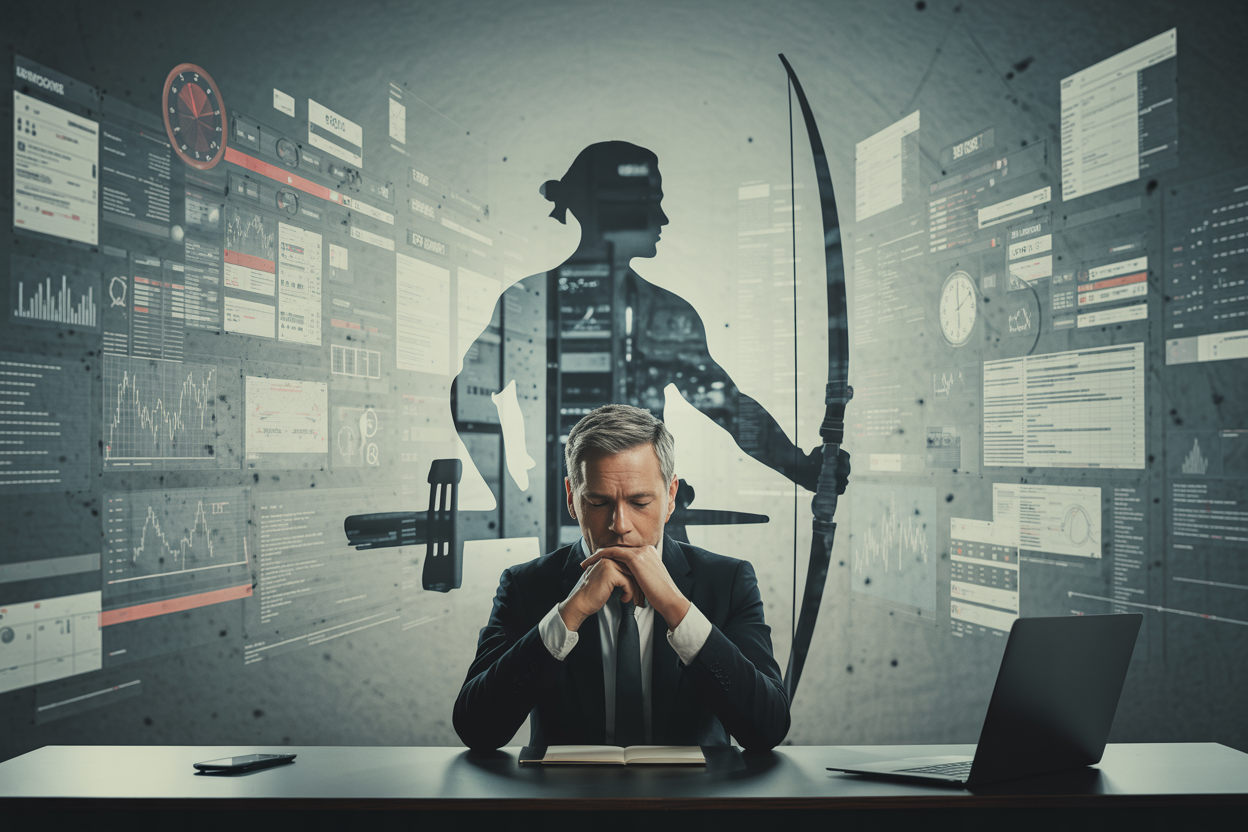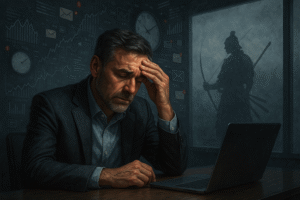Mental Fatigue: The Hidden Tax on High Performers

Hey there, I’m Gregg Swanson. My journey has taken me from the dojo to the summit and the sales floor to spiritual retreats.
Over the last 20 years, I’ve coached individuals to harness their mental and emotional strength.
Ready to create your best day yet? Let’s begin by investigating mental fatigue.
Mental fatigue doesn’t knock you out…it wears you down. Quietly. Relentlessly.
It shows up not as burnout’s big dramatic collapse, but as the subtle, sneaky erosion of your edge. The brain fog. The irritability. The inability to make one more damn decision by 3 p.m.
And for high performers, it’s the silent killer of clarity, consistency, and confidence.
Mental fatigue is the hidden tax on leadership. It’s the reason you feel wired but tired, present but unfocused, driven but directionless. And if you’re not building “cognitive stamina” to handle the demands of modern leadership, you’re already behind.
But here’s the good news: your brain is trainable. Just like your body.
In this post, we’ll break down:
✔️ What mental fatigue actually is (and isn’t)
✔️ Why high-achieving leaders are most at risk
✔️ The Conscious Warrior approach to brain resilience
✔️ 6 neuroscience-backed ways to build cognitive stamina
Let’s reclaim your mental edge.
What is Mental Fatigue?
Mental fatigue is what happens when your cognitive load outpaces your brain’s ability to recover. It’s not about being lazy…it’s about being overloaded.
Every decision, distraction, and task-switch drains your mental energy like apps draining your phone battery. And just like your phone, your brain will overheat, slow down, and eventually shut off if you don’t recharge it.
Symptoms of mental fatigue include:
✔️ Decision fatigue (everything feels like too much and even small choices feel like a burden)
✔️ Short temper or emotional reactivity (you snap at minor annoyances or feel overwhelmed by emotions)
✔️ Difficulty concentrating or zoning out (your thoughts scatter or drift mid-conversation or task)
✔️ Impulsive or avoidant behavior (you either lash out or shut down to escape mental overload)
✔️ A feeling of “mental molasses” (like your brain is trying to move through wet cement)
It doesn’t mean you’re broken. It means your brain is overused and under-recovered.

Why High Performers Are Most at Risk
Here’s the paradox: the more capable you are, the more likely you are to push too hard for too long.
High achievers live in “go mode.”
You lead teams, run businesses, make countless micro-decisions, and juggle responsibilities like a Navy SEAL on Red Bull. You pride yourself on being reliable, responsive, and always on.
But this very mindset creates the perfect storm for mental fatigue:
✔️ Over-scheduling means you never truly rest, leading to chronic stress that erodes creativity and clarity
✔️ Multitasking destroys focus and depletes working memory, causing mental exhaustion with every switch
✔️ Constant context switching creates cognitive friction that compounds and amplifies fatigue throughout the day
✔️ Never saying no leads to decision paralysis, draining your confidence and undermining your priorities
And the badge of honor for burning the candle at both ends? It becomes a noose.
Leaders, executives, entrepreneurs…you don’t just need physical stamina. You need cognitive stamina to stay sharp, grounded, and clear under pressure.
The Hidden Costs of Mental Fatigue
Mental fatigue doesn’t just make you tired—it chips away at your performance in ways you don’t immediately see.
You’re not just slower—you’re less strategic. You’re not just distracted—you’re more reactive. And over time, these hidden costs compound into real-world consequences.
Leadership Erosion
When you’re mentally fatigued, you delegate poorly, lose patience with your team, and default to micromanagement. Your ability to inspire confidence disappears—because you’re not radiating clarity, you’re radiating chaos.
Decision-Making Errors
Cognitive exhaustion leads to poor choices. That could mean hiring the wrong person, approving a flawed proposal, or failing to see a red flag until it’s too late. What seems like a “gut call” under fatigue is often just a shortcut made under pressure.
Relationship Breakdown
Whether it’s your team, your partner, or your family—when you’re fried, they feel it. You zone out during conversations. You snap over small things. You miss key emotional cues. Connection breaks down when mental bandwidth is gone.
Financial Fallout
Missed deals. Overspending. Delayed launches. Mental fatigue causes mistakes that ripple into your bottom line. One executive shared how three back-to-back high-pressure weeks led to a $25,000 loss—simply because he didn’t catch a contract error.
Mental fatigue doesn’t show up on spreadsheets—but the damage is real.
The more responsibility you carry, the more important it is to guard your mental edge.
Podcast: Play in new window | Download (26.9MB)
Subscribe: RSS
The Conscious Warrior Framework for Mental Resilience
So how do you fix this?
You don’t hustle harder.
You shift your identity from reactive performer to Conscious Warrior.
The Conscious Warrior trains for the long game. They operate from awareness, not autopilot. They master recovery with the same discipline they apply to performance.
This shift is grounded in the 4 Pillars of the Conscious Warrior:
1.) Mental Strength
- Build attention stamina through single-tasking, sharpening focus and avoiding scattered thinking
- Create mental boundaries (no more open-loop thinking or endless decision cycles)
- Prioritize clarity over complexity to reduce overwhelm and regain control
2.) Physical Optimization
- Move daily to oxygenate and regulate the brain, supporting mental clarity and resilience
- Fuel your system with clean nutrition and hydration to stabilize energy and mood
- Respect the recovery cycle (sleep is sacred and essential for brain detoxification)
3.) Emotional Mastery
- Learn to notice and process stress before it floods you and derails your focus
- Use breathwork and stillness to reset the nervous system and calm reactivity
- Disconnect your identity from your stress levels to maintain emotional sovereignty
4.) Spiritual Alignment
- Anchor to something deeper than performance metrics, such as purpose or legacy
- Practice presence: train your mind to be where your feet are, fully
- Remember: purpose is the ultimate energy source that fuels discipline and resilience
This is how we fight mental fatigue…not with more coffee, but with conscious living.

6 Neuroscience-Backed Tactics to Build Cognitive Stamina
Alright, let’s get tactical. Here are science-backed methods you can start using today to combat mental fatigue and reclaim your brainpower.
1.) Use Ultradian Rhythm Breaks (90/20 Rule)
Your brain works best in 90-minute cycles. Push past that, and performance drops.
Do this: Work for 90 minutes, then break for 15–20. Get up. Walk. Breathe. Stare at trees. Don’t scroll.
2.) Prioritize Sleep Like a Savage
Your brain’s glymphatic system (its self-cleaning mechanism) only works during deep sleep. Miss this, and mental fog stacks.
Do this: Go to bed and wake up at consistent times. Cut screens 1 hour before bed. Use blackout curtains. No exceptions.
3.) Stop Feeding the Dopamine Machine
Every app, ping, and scroll hijacks your dopamine. That cheap hit? It costs you long-term motivation and clarity.
Do this: Schedule “dopamine fasts.” No tech first hour of the day. Single-task your focus. Delete toxic apps.
4.) Fuel the Brain Properly
Mental fatigue increases when the brain runs on junk. It needs essential fats, hydration, and micronutrients to stay resilient.
Do this: Eat brain food: wild salmon, leafy greens, berries, walnuts. Hydrate. Consider magnesium and Omega-3s.
5.) Single-Task Like a Samurai
Multitasking is a myth. What you’re really doing is rapid-fire distraction.
Do this: Block time for ONE task. Set a timer. Eliminate all other inputs. Let your mind lock in.
6.) Train Presence Through Breathwork & Stillness
The Conscious Warrior trains calm under pressure. Breath is the bridge.
Do this: 5 minutes per day. Inhale for 4, hold 4, exhale 6. Do it before meetings, workouts, or whenever your brain feels fried.
Final Reflections: The Warrior’s Edge
Mental fatigue is not a sign that you’re broken.
It’s a sign that you’re human… and that your current pace is unsustainable.
The truth? The sharpest minds don’t run 24/7. They recover, recalibrate, and reengage with intention. That’s what separates the drained executive from the Conscious Warrior.
Cognitive stamina is your hidden edge. Train it like your squat. Honor it like your mission. Protect it like your purpose.
Because when your mind is clear, your path is unstoppable.
Ready to Recharge?
Download your free guide: From Burnout to Bulletproof
Or if you’re ready to upgrade your mental game, book your Reset Call and take the first step into the Conscious Warrior path.
FAQs: Mental Fatigue
Q1: What causes mental fatigue in high achievers?
Constant decision-making, lack of recovery, stress, multitasking, and overstimulation from tech and work demands.
Q2: How do I know if I have decision fatigue?
Symptoms include indecisiveness, impulsive choices, irritability, and cognitive sluggishness.
Q3: Can I reverse mental fatigue naturally?
Yes. Use sleep hygiene, nutrition, breathwork, digital detox, and ultradian rhythm recovery.
Q4: What is the Conscious Warrior method for fighting mental fatigue?
A four-pillar framework addressing mental, physical, emotional, and spiritual resilience.
Q5: How quickly can I recover from mental fatigue?
Recovery time varies, but consistent daily practices can show results within 7–10 days.


